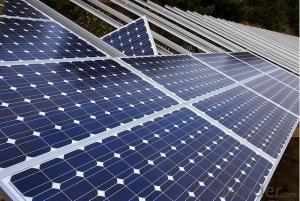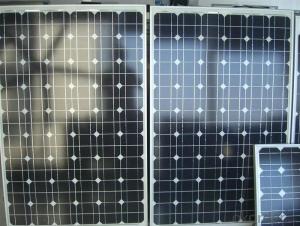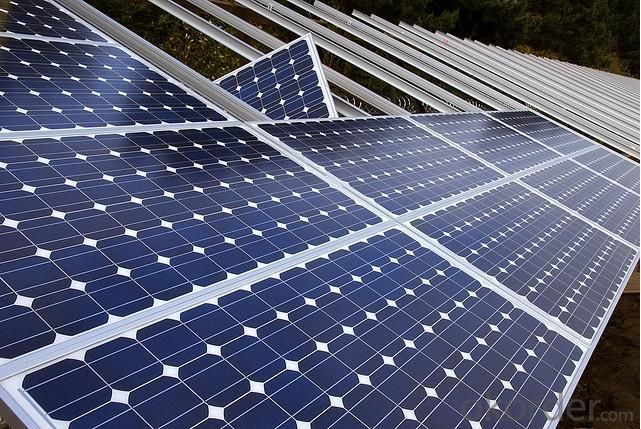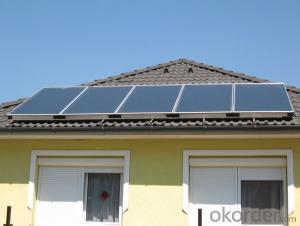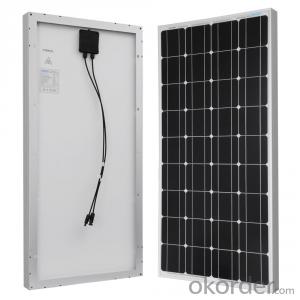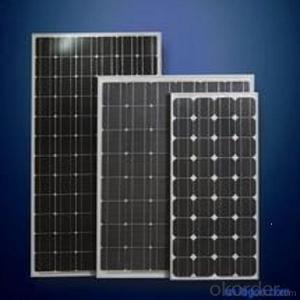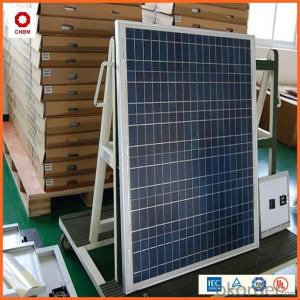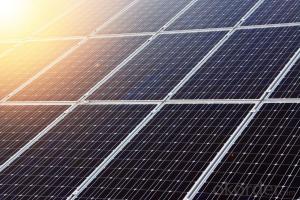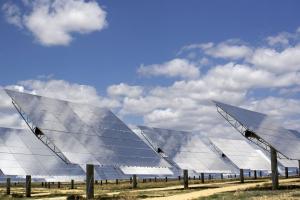In Roof Solar Panels:Solar Panel Solar Module PV Solar with UL TUV Certificates 260W
- Loading Port:
- Shanghai
- Payment Terms:
- TT OR LC
- Min Order Qty:
- 1 watt
- Supply Capability:
- 10000000 watt/month
OKorder Service Pledge
OKorder Financial Service
You Might Also Like
Specification
Solar panel material
1. glass
Its main role is to protect the power generation ( solar cells ) , there is a selection of light transmittance requirements : 1 ) must be high transmittance (typically 91% or more ) ; 2 ) super white steel processing.
2. EVA
For bonding glass and power generation fixed body ( such as cells ) , transparent EVA material directly affect the life of components exposed to the air EVA prone aging yellow , thus affecting the transmittance components , thus affecting in addition to generating the quality of the components itself, the quality EVA lamination process on the component manufacturers is also very large, such as EVA plastic viscosity of non-compliance , EVA and glass, back bonding strength is not enough, can cause premature aging EVA, the affected component life.
3. Solar cells
The main role is to generate electricity , the electricity is the main market mainstream film crystalline silicon solar cells , thin-film solar cells , both have their advantages and disadvantages . Crystalline silicon solar cells , the equipment costs are relatively low , but the high cost of consumption and cells , photoelectric conversion efficiency is high, the next generation in outdoor sunlight is more appropriate ; higher thin-film solar cells , the relative cost of equipment , but the cost of consumption and battery low, relatively low photoelectric conversion efficiency of crystalline silicon solar cells , but the effect is very good low-light , in the ordinary light can also generate electricity , such as solar calculator .
4. backplane
Sealing, insulation , water ( usually with TPT, TPE , etc. ) the material must be resistant to aging , component manufacturers generally have warranty for 25 years , tempered glass, aluminum is generally no problem , the key lies in whether the backplane and can meet the requirements of silica gel.
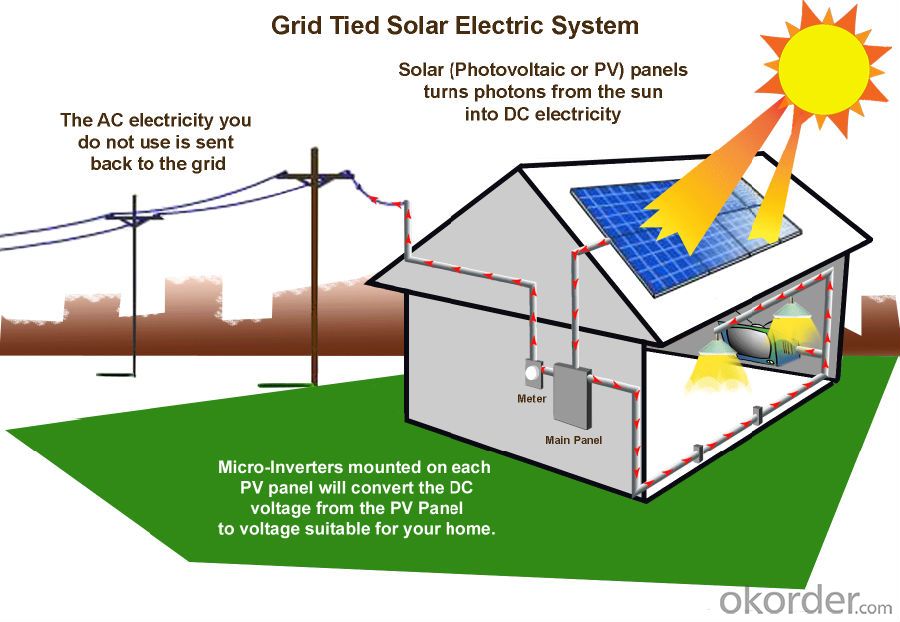
PERFORMANCE
- High effi ciency, multicrystalline silicon solar cells with high transmission and textured glass deliver a module effi ciency of up to 16.0%,
minimizing installation costs and maximizing the kWh output of your system per unit area.
- Tight positive power tolerance of 0W to +5W ensures you receive modules at or above nameplate power and contributes to minimizing
module mismatch losses leading to improved system yield.
Structure of Polycrystalline Silicon Solar Panel Type
Solar modules, which are widely used in ground mounted utility-scale PV plants, large-scale and small civil and commercial power generating system such as BIPV combined to the grid, roof-mounted PV power system, rural electrification, communications, emergency auxiliary power.
Solar PV module is comprised of some solar cells which are connected in serial with high efficiency and enhanced reliability.
Advantages of Monocrystalline Silicon Solar Panel
• CNBM Solar performance guarantees for 25 years
• 12 years guarantee for workmanship
• Timeliness of delivery
• Quality Products certified (TÜV, UL, CE, VDE, ISO)
CNBM International Corporation's products including Monocrystalline Solar Panel, Polycrystalline Solar Panel have received and enjoyed famous reputation in many countries and regions in the world .As a solar panel supplier in China, we strive to provide our customers with excellent service, superior products and unmatched value.
- Q: Single crystal solar panels and polycrystalline solar panels
- Monocrystalline silicon solar cells are mainly made of monocrystalline silicon, compared with other types of solar cells, monocrystalline silicon cell conversion efficiency of the highest. In the early days, monocrystalline silicon solar cells occupied most of the market share, in 1998 after the retreat of polysilicon, the market share accounted for second. Due to the shortage of polysilicon raw materials in recent years, after 2004,
- Q: What is the environmental impact of solar panels?
- Solar panels have a positive environmental impact as they generate clean and renewable energy. They reduce greenhouse gas emissions, air pollution, and dependence on fossil fuels, mitigating climate change and improving air quality. However, their production and disposal do have some environmental impact, including resource extraction and waste management, but these impacts are significantly lower compared to conventional energy sources.
- Q: I have an inverter and a battery 20 Amperes.Daily sun shine approx. 7 Hours.Do I need to buy anything or should I connect the solar panel to the Battery direct?
- No, don't connect the panel directly to the battery. You need to isolate the solar panel charging output from the AC-powered charger. A couple of high-current diodes arranged with their anodes connected to the charging sources in the positive supply line will allow either the charger or the solar panel to lift the voltage high enough to charge the battery, albeit with about 0.6 volts dropped across the diode. Both cathode ends would be connected to the battery. This arrangement allows a positive current to flow from either or both charging sources at the same time, although in practice, one will generally be higher than the other. Also, if the AC charger's voltage is significantly higher than the solar panel, the charger may always charge the battery. You would need to regulate its output to be slightly lower than the solar panel when it's near it's minimum useful operating voltage. (note that the 0.6 forward bias voltage on the diode might prevent the solar panel from completely charging the battery if it has any voltage regulation on its output)
- Q: Can solar panels be used in areas with high levels of wind-blown debris?
- Yes, solar panels can be used in areas with high levels of wind-blown debris. However, it is important to install the panels in a way that minimizes the impact of the debris. This can be achieved by using protective measures such as installing wind deflectors or choosing panels with stronger frames and tempered glass. Regular maintenance and cleaning may also be required to ensure optimal performance in such conditions.
- Q: Im curious because I read about a boy who invented a 3d solar panel, using a pyramid he designed a solar panel that collects light more efficiently. Now I have a question. Why cant I design a solar panel that takes adventage of convex and concave mirror's and use a surface that collects light and then focus's the suns energy into a beam and take the beam into a chamber where the solar panels are sitting and surround them with mirrors as well, so any light not obsorbed by one particular spot is reflected to another area for reabsorbtion. I know solar panels dont absorb light but perhaps that will allow more light to create the effects it needs.
- I don't know anything about the 3D thing. You cannot get more energy out, than goes in. Energy will only hit the mirrors. With some loss of efficiency they would reflect a focused beam into the chamber, where with some more losses would reflect it to the solar panels. It would be more efficient just to expose all the panels to sunlight.
- Q: Can solar panels be damaged by hail or other elements?
- Yes, solar panels can be damaged by hail or other elements. Hailstones can cause cracks or dents in the panels, impairing their functionality. Other elements like heavy rain, strong winds, or debris from storms can also potentially damage solar panels. However, most solar panels are designed to withstand typical weather conditions and are often tested for durability.
- Q: Pros and Cons if I get solar panels?
- At the present time, even with the government paying some, they are not cost effective. If you live in middle of nowhere and you want to be prepared in case all Hell breaks loose, and you can install your own, then I might consider them as a backup plan only if I did not have a running stream with 0 feet of drop. You can make a water generator really cheap if you have that creek. Call a solar panel company and get a quote. Do the math and see how long it takes for pay back. They are also allergic to hailstorms. My son did and it was something like 40 years to break even.
- Q: Can solar panels be used to charge electric vehicles?
- Yes, solar panels can be used to charge electric vehicles. By installing solar panels on rooftops or in parking lots, the energy generated from the sun can be used to charge the batteries of electric vehicles, providing a clean and sustainable source of power. This helps reduce reliance on fossil fuels and promotes renewable energy use in transportation.
- Q: I need to know where I can buy the parts or find them as scrap to make my own solar panels. Is there a cheap way of buying the panels or can I make them myself.
- Build okorder /
- Q: Can solar panels be installed on a hospital or medical facility?
- Yes, solar panels can be installed on a hospital or medical facility. Solar panels can help hospitals and medical facilities reduce their electricity costs and reliance on the grid, while also promoting clean and sustainable energy.
Send your message to us
In Roof Solar Panels:Solar Panel Solar Module PV Solar with UL TUV Certificates 260W
- Loading Port:
- Shanghai
- Payment Terms:
- TT OR LC
- Min Order Qty:
- 1 watt
- Supply Capability:
- 10000000 watt/month
OKorder Service Pledge
OKorder Financial Service
Similar products
Hot products
Hot Searches
Related keywords
